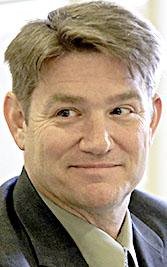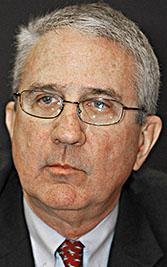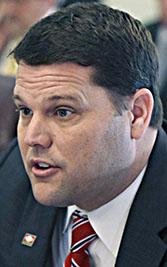A proposed constitutional amendment that would limit state lawmakers to serving a maximum of 10 years qualified for the Nov. 6 general election ballot, an official in the secretary of state's office said Friday.
The Arkansas Term Limits committee's ballot proposal also would limit lawmakers to serving three two-year terms as a state representative, two four-year terms as a senator or any terms that would exceed a total of 10 years in the General Assembly. The amendment wouldn't affect members of Congress.
If approved by voters, Arkansas' legislative term limits would be the strictest in the nation, said John Mahoney, a policy specialist for the National Conference of State Legislatures.
Under the committee's proposal, lawmakers' service on or after Jan. 1, 1993, would be included in calculating allowable service.
The proposal wouldn't cut short or invalidate a term for which a representative or senator was elected before its effective date on Jan. 1, 2019.
The two-year terms served once a decade by some senators after census-driven redistricting would be included in the 10-year limit.
Currently, lawmakers may serve up to 16 years in the House, Senate or both under Arkansas Constitutional Amendment 94, which voters approved in November 2014. Some senators are able to serve longer if they draw two-year terms because of once-per-decade redistricting.
The nation's strictest term limits are in California and Oklahoma, which both limit lawmakers to serving 12 years, Mahoney said.
Fifteen states set term limits on state lawmakers, according to the National Conference of State Legislatures' website. Besides Arkansas, California and Oklahoma, the other states are Arizona, Colorado, Florida, Louisiana, Maine, Michigan, Missouri, Montana, Ohio, Nebraska, Nevada and South Dakota.
Leslie Bellamy, director of elections in the Arkansas secretary of state's office, said the initial count of signatures submitted on petitions by the Arkansas Term Limits committee was 124,674. Secretary of State Mark Martin's office determined that there were 93,998 valid signatures, well above the amount needed.
To get on this year's general election ballot, sponsors of constitutional amendments are required to turn in 84,859 valid signatures of registered voters, so the committee met the requirements established by Article 5, Section 1, of the Arkansas Constitution, Bellamy said Friday in a letter to the committee chairman, Tom Steele of Little Rock.
Martin intends to certify the proposed constitutional amendment to the county boards of election commissioners later this month, Bellamy said.
Steele said he felt "pure joy" upon learning that the proposal has qualified for the general election ballot because he and others have been working on that for a few years.
"We realize there may be a potential for a legal challenge," he said. "There is a lot of powerful folks who have an interest in this. They're not going to be happy seeing this on the ballot.
"We have a comfortable enough margin [of signatures] we might be OK," Steele said.
He added, "I'm hoping there won't be any challenges."
Randy Zook, president and chief executive officer of the Arkansas State Chamber of Commerce/Associated Industries of Arkansas, said Friday that the group was considering a legal challenge. He declined further comment.
Senate Republican leader Bart Hester of Cave Springs said that if the proposal is on the ballot, "the odds of passing it will be very high."
If voters approve the proposal, Hester said, all but four of 35 senators would be restricted from running for re-election by 2022.
In the House, several dozen representatives would be barred from seeking re-election in 2020, and many others would be restricted in 2022.
"When you make [term limits] so extreme and so fast, turnover is a concern," Hester said.
House Speaker Matt Shepherd, R-El Dorado, said the proposed amendment would weaken the Legislature compared with other branches of state government and weaken the House compared with the Senate.
"It would be detrimental to rural areas outside of Little Rock that wouldn't have the type of familiarity with Little Rock and state government," he said.
Asked what he thought voters would do, Shepherd said, "It remains to be seen what will happen, just like with anything else."
Two years ago, the Restore Term Limits committee failed to collect enough signatures to qualify its proposal for the 2016 general election ballot. The Restore Term Limits committee said it gathered more than 50,000 signatures, but it was blocked from hiring enough paid signature gatherers for a two-month period to meet that year's requirement of about 85,000 signatures.
Before Amendment 94, lawmakers had been limited to serving up to three two-year terms in the state House plus up to two four-year terms in the state Senate under Amendment 73, which was approved by voters in 1992. Some senators were able to serve longer if they drew two-year terms tied to once-per-decade redistricting.
In the 2004 general election, voters rejected a proposed amendment to allow representatives to serve six two-year terms and senators to serve three four-year terms.
"We are looking for justice for the voters," Steele said Friday. "In 2014, voters didn't know what they were getting was term limits, and it wasn't on the ballot title."
Beyond extending the period that lawmakers could serve in the Legislature, Amendment 94 also barred lawmakers from accepting certain gifts, such as meals and drinks in one-on-one meetings, with lobbyists; created a citizens commission to approve increased salaries of state elected officials; barred direct corporate and union contributions to state elected officials; and extended the cooling-off-period to two years before ex-lawmakers can register as lobbyists.
Through the end of June, the U.S. Term Limits ballot question committee reported receiving contributions totaling $421,125.60 from U.S. Term Limits' general fund and spending the same amount with California-based Arno Petition Consultants to collect signatures, according to its reports.
U.S. Term Limits advocates for term limits at all levels of government and has assisted in enacting and defending term limits on state legislatures in 15 states, according to its website. U.S. Term Limits' board of directors includes Tim Jacob of Little Rock, who is a spokesman for the Arkansas' Term Limits ballot question committee.
According to its latest report, the Arkansas Term Limits committee reported raising $8,200 and spending $8,604 through the end of June. It reported a campaign balance of $411.34 on June 30. The Family Council Action Committee in Arkansas also reported raising $770 and spending $691.91 for petitions on the proposed constitutional amendment through the end of June.
Doyle Webb of Benton, chairman of the state Republican Party, said, "As Republicans we trust the will of the people and support our state's motto of Regnat populus (the people rule).
"However, we believe citizens should ask: Why are forces outside the state funding getting this measure on the ballot? Why do they want to hold Arkansas down when it has finally experienced the lowest unemployment and highest income tax reduction in our state's history?
"Finally, we believe that those who have signed petitions have been misled into thinking we have had these term limits before when in fact they are not the same," Webb said in a written statement. He urged voters to reject it.
The Democratic Party of Arkansas didn't respond to a request for a statement.
A Section on 08/04/2018



